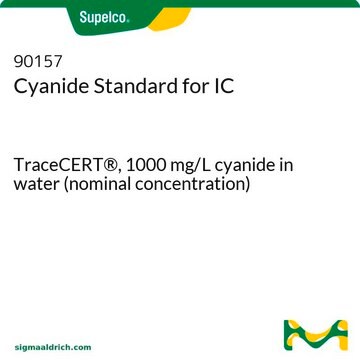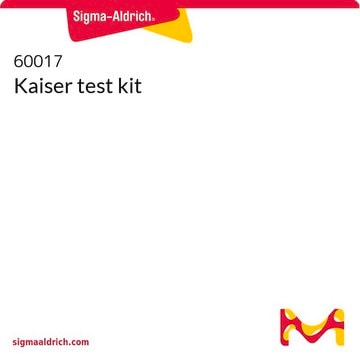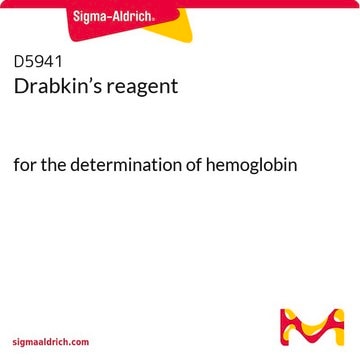About This Item
Recommended Products
grade
technical
Quality Level
Assay
≥96%
form
solid
pH
11.5 (20 °C, 20 g/L)
mp
634 °C (lit.)
cation traces
Na: ≤5000 mg/kg
SMILES string
[K]C#N
InChI
1S/CN.K/c1-2;
InChI key
YUZRZFQHUCKACF-UHFFFAOYSA-N
Looking for similar products? Visit Product Comparison Guide
Application
- Characterization, antimicrobial and antitumor activity of superoxide dismutase extracted from Egyptian honeybee venom (Apis mellifera lamarckii).: This study explores the extraction and characterization of superoxide dismutase from honeybee venom, highlighting its antimicrobial and antitumor properties. Potassium cyanide was used in the biochemical analysis to understand the enzyme′s activity and stability (Abdel-Monsef et al., 2023).
- Cytochromes P450 2C8 and 3A Catalyze the Metabolic Activation of the Tyrosine Kinase Inhibitor Masitinib.: This research investigates the metabolic pathways of masitinib, focusing on the role of cytochromes P450. Potassium cyanide is used to inhibit specific enzymatic activities during the analysis, providing insights into drug metabolism and potential toxicological impacts (Latham et al., 2022).
- Profiling of in vivo, in vitro and reactive zorifertinib metabolites using liquid chromatography ion trap mass spectrometry.: The study details the metabolic profiling of zorifertinib using advanced chromatographic techniques. Potassium cyanide serves as an analytical reagent to assess the stability and reactivity of various metabolites (Al-Shakliah et al., 2022).
- Structural and Biochemical Characterization of a Dye-Decolorizing Peroxidase from Dictyostelium discoideum.: The research characterizes a peroxidase enzyme from Dictyostelium discoideum, utilizing potassium cyanide in the enzymatic assays to inhibit specific reactions and better understand the enzyme′s functionality (Rai et al., 2021).
Signal Word
Danger
Hazard Statements
Precautionary Statements
Hazard Classifications
Acute Tox. 1 Oral - Acute Tox. 2 Dermal - Acute Tox. 2 Inhalation - Aquatic Acute 1 - Aquatic Chronic 1 - Met. Corr. 1 - STOT RE 1
Target Organs
Thyroid
Supplementary Hazards
Storage Class Code
6.1A - Combustible acute toxic Cat. 1 and 2 / very toxic hazardous materials
WGK
WGK 3
Flash Point(F)
Not applicable
Flash Point(C)
Not applicable
Certificates of Analysis (COA)
Search for Certificates of Analysis (COA) by entering the products Lot/Batch Number. Lot and Batch Numbers can be found on a product’s label following the words ‘Lot’ or ‘Batch’.
Already Own This Product?
Find documentation for the products that you have recently purchased in the Document Library.
Customers Also Viewed
Our team of scientists has experience in all areas of research including Life Science, Material Science, Chemical Synthesis, Chromatography, Analytical and many others.
Contact Technical Service

![Cyanide standard solution traceable to SRM from NIST K₂[Zn(CN)₄] in H₂O 1000 mg/l CN Certipur®](/deepweb/assets/sigmaaldrich/product/images/920/032/af45eec3-100b-4996-8eb3-c3942d441bc9/640/af45eec3-100b-4996-8eb3-c3942d441bc9.jpg)













